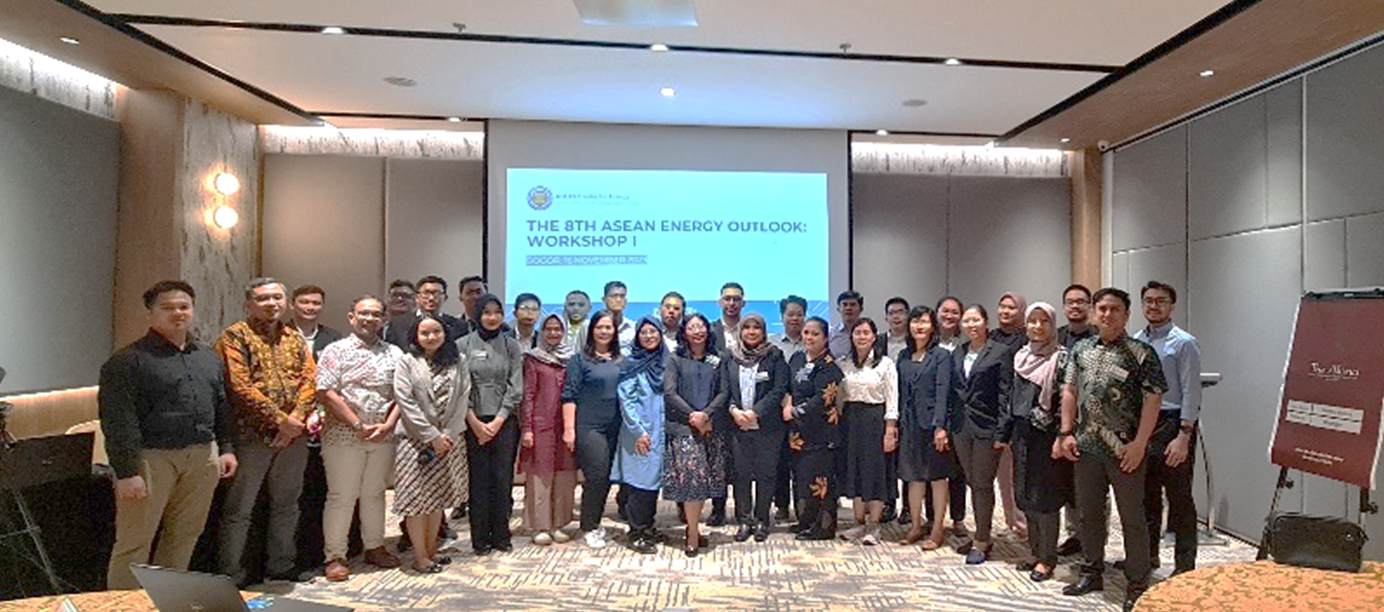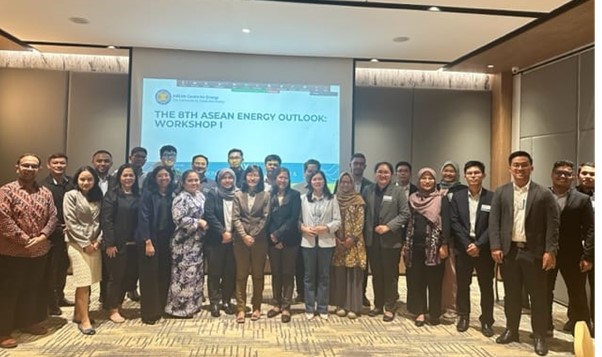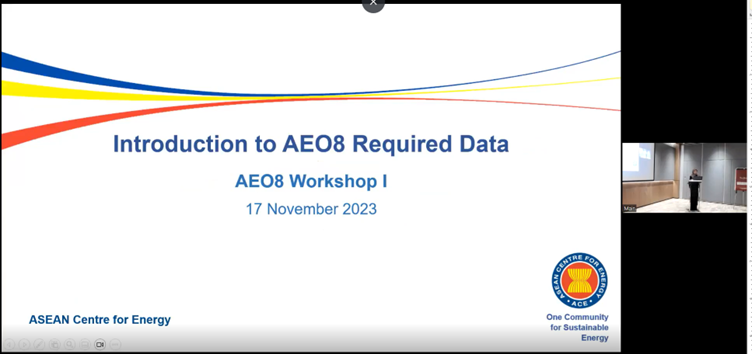Menu

Supported by the United States Agency for International Development’s Southeast Asia Smart Power Program (USAID SPP), the ASEAN Centre for Energy (ACE) hosted the third day of the AEO8 Workshop I, which was led by the Energy Modelling and Policy Planning (MPP) department for a sharing session between ACE and ASEAN Member States (AMS). Still taking place in Bogor with hybrid mode, the Workshop aims to provide possible input for the ASEAN energy scenarios based on the information from AMS.
The first agenda of the Workshop I was opened by Ms Rika Safrina, the AEO8 Project Lead of ACE, to explain briefly about AEO7 data modelling and present the development of AEO8. Moreover, she also highlighted several plans of the AEO8 modelling plan, including exploring Carbon Neutrality as a new scenario. The AEO8 will also incorporate new thematic regional energy insights, such as smart demand response, Carbon Capture, Utilization and Storage (CCUS), and carbon pricing. The outlook is planned to be launched during the 42nd ASEAN Ministers on Energy Meeting (AMEM) 2024.
The Workshop continued by inviting focal points from AMS to present briefly about their respective national energy outlooks, particularly the energy targets. The focal points consisted of energy modellers and data/statistics from the energy ministries of AMS. All 10 AMS were present on Day 3 of AEO8 Workshop I, generating constructive dialogue to give updates about their recent aspirations in the energy sector.
Followed by setting-the-scene on the ongoing regional strategies, such as the ASEAN Plan of Action for Energy Cooperation (APAEC) Phase II and other ASEAN Sustainability Agenda. Mr Rizky Aditya Putra, Senior Officer of APAEC, ACE, showcased the progress towards the target achievement of APAEC and the future directions for the next cycle of APAEC. Meanwhile, Mr Indra Wahyudin, introduced several initiatives, including Circular Economy Framework, ASEAN Strategy for Carbon Neutrality, ASEAN Blue Economy Framework, and Decarbonisation of the Transport Sector agenda, for the development towards sustainable and inclusive region.
In addition, representatives from ACE also presented the relevant sectoral strategies within the region. In power and alternative energy sectors. To optimse the study of AEO8, Ms Nadhilah Shani, Senior Analyst of Power, Fossil Fuel, Alternative Energy and Storage (PFS), ACE explained what can be learned from the updated ASEAN Interconnection Master Plan Study (AIMS) III Phase 1 & Phase 2 for the AEO development. She further gave a comprehensive insight on ASEAN hydrogen for the AEO study, which needs to consider the scope of hydrogen type and the assumed utilisation for the model. Mr Adhityo Baskoro, PFS Officer, also delivered several recommendations to the AEO8 for further study of the integration of fossil fuels with advanced CCUS technologies. Those are holistic integration of fossil fuel data, examining the impact of regional cooperation on fossil fuel dynamics for energy modelling, as well as updating the potential CCS/CCUS sites to evaluate emissions reduction opportunities in certain areas.
The third speaker, Ms Monika Merdekawati, Research Analyst of Sustainable and Renewable Energy (SRE) of ACE, explained the opportunity of RE, particularly bioenergy, in ASEAN. Still, the technology barriers to energy transition remain the problem. She also revealed how the costs for RE technology remain higher in ASEAN countries, and the study projected that the region requires higher investment. Meanwhile, Mr Rio Jon Piter Silitonga, Energy Efficiency and Conservation Officer of ACE, elaborated on the energy efficiency roadmap for buildings and cooling sectors. He also asserted the need to implement building performance codes and capacity-building incentives.
Following speakers’ presentations, further discussion among participants and speakers was fruitful throughout the day. Finally, the kick-off meeting was summarised, consolidating recommendations from speakers to improve and maximise AEO8.

The fourth day was attended only by representatives from AMS and the AEO8 ACE working group. The day’s main focus was to set scenarios and confirm data arrangements for the model created in AEO8. This was to ensure that all AMS agreed upon assumptions and priorities for AEO8. The discussion also addressed issues that may come up during the modelling for AEO8, such as missing data and consideration of future key figure trends.
The day started with discussions regarding scenarios for AEO8. Mr. Michael Petalio and Mr. M Shidiq, MPP Modelers from ACE led the discussion. This was done using a poll-based decision regarding specific scenarios followed by discussions on the poll’s outcome, specifically why AMS representatives choose the options they chose. This was to ensure that the minority outcome was also heard by others, which could possibly change their choice for the poll.

The scenarios discussed will directly impact how AEO8 will be modelled, thus it is important that all AMS agree upon the scenarios and assumptions used. The discussion points included demand-side scenarios, demand growth, nationally determined contributions (NDC), national policies, energy transition, renewable energy topics and other energy related topics.
The second main agenda of the day was to confirm and validate the AMS data that ACE will use for data modelling in AEO8. This was done in the form of a data café, where AMS will take turns in different data focus points. There were four focus points: Socio-economic and policy, Energy Balance Table (EBT), demand, supply and transformation data, and an AMS Survey. The representatives from AMS will discuss with subject matter experts from the MPP team of ACE. Each AMS will have 15 minutes to discuss relevant details in each focus point.

Before the discussion took place, Ms Silvira Rosalia, Data Statistician from ACE, spoke about the data need of AEO8. She presented the various data needed for the data modelling and the approach taken for the analysis. In addition to speaking about necessary data topics, she also mentioned the lessons learned from past AEO projects.
Socio-economic and policy are data points and relevant public policies that address economic data (i.e. GDP, cost and investment, energy-related employment) and demographic data (i.e. urban and rural population, energy access data). EBT and demand look into demand and energy needs data, such as demand in the industrial, commercial, transportation, and agriculture sectors. While supply and transformation primarily focus on data regarding energy supply, energy production and power plants.
The end of day four and the first AEO8 Workshop closes with remarks from Dr Zulfikar Yurnaidi, MPP manager from ACE. He recaps all the events done in all four days of the Workshop including technology capacity building and uses for new technology for AEO8 data modelling. He mentioned the future requirements and possible challenges that must be addressed during the AEO8 period. He finished his remarks with positivity towards the next steps of the AEO8 process and looks forward to the country visits due at the beginning of 2024 for further data and model framework validation.
Related articles:
